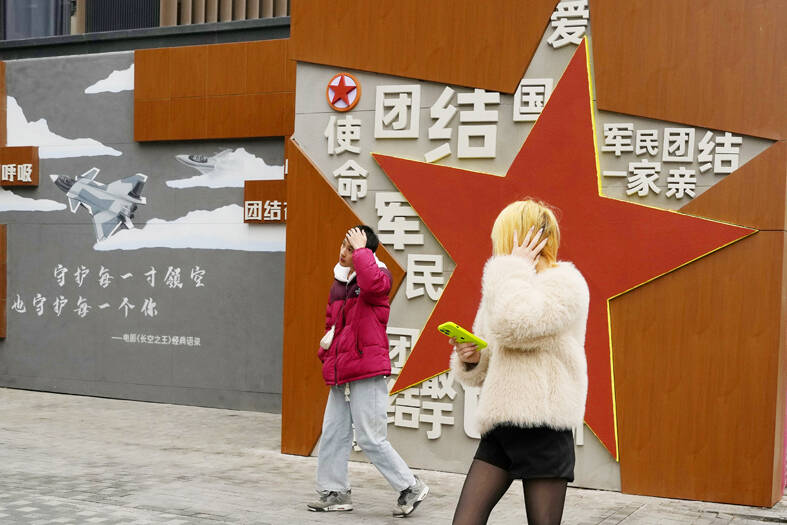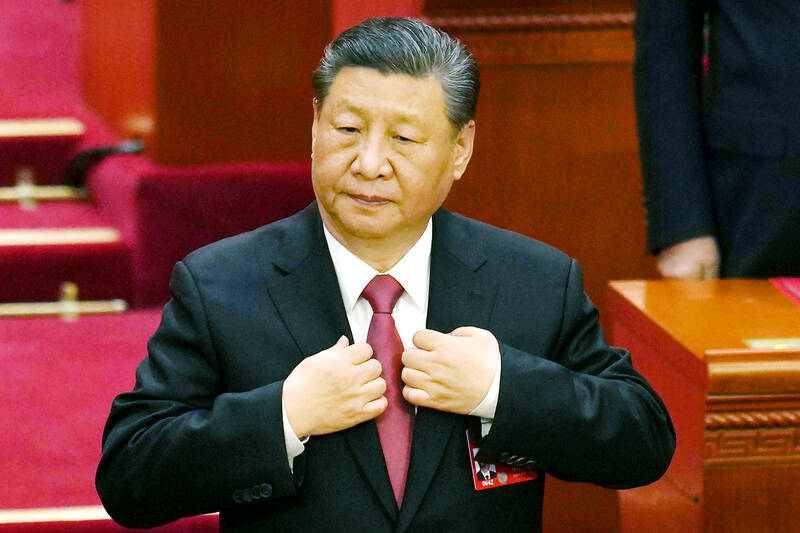Lottery shops in China are ditching bland storefronts to reinvent themselves as hipster hangouts, with slogans that tempt youngsters hit by an economic slowdown with the lure of getting rich quick.
“We should still have dreams, who knows one day they may come true?” reads one sign at one lottery store in Chongqing, in southwestern China. With sleek outside seating styled like a trendy cafe, its tagline is “more than just a lottery shop.”
Another “Lotto Coffee” store in Kunming, capital of the southwestern province of Yunnan, promised a free scratch ticket with every coffee purchase. “A cup of coffee with good luck,” said a slogan on the wall. Sales of scratch-offs, which offer instant results, last year were the highest in data going back to 2008, official statistics show.

Photo: AP
The push to attract younger customers is paying off. Sales from state-approved lottery games soared to a record 580 billion yuan (US$80.6 billion) last year, data from the Finance Ministry show. More than four-fifths of those customers were aged 18-34; up from just over half in 2020, according to domestic market research firm Mob Data.
HARD TIMES
That surge came as youth unemployment soared last year, hitting a record in June as China’s massive economy stumbled out of a prolonged pandemic isolation. Graduates today enter a job market in an era of slower growth than their parents’ generation, and endure cut-throat competition for positions.

Photo: AP
People are likely turning to things like the lottery to “seek their fortune and success simply because of an increasingly stressful economic environment and job market,” said Dominic Chiu, senior analyst at Eurasia Group.
Before the pandemic, lottery sales tended to accelerate when the economy was doing well. That’s because the clientele was mainly lower-income groups including blue-collar workers who only had spare cash when their salaries grew. Now, it’s young, educated and city-dwelling consumers pushing up sales.
While China’s industrial sector surged at the beginning of the year, economists warn the official growth goal of about 5 percent is still ambitious. President Xi Jinping (習近平) bid to wean China off decades of debt-driven growth from the embattled property sector means there’s no big stimulus package coming to the rescue.
“It’s so difficult to make money now, no matter what you do,” said Wu Zehao, 18, a first-year film student at Communication University of China in Beijing.
Speaking outside a lottery shop on a sunny afternoon in a touristy area of the capital, Wu said he had been spending 30 yuan on the lottery every day since he won 100 yuan during a recent holiday. “I seriously think it’s more likely you’ll get rich from the lottery than from working,” he added.
FORTUNE COUPONS
With the overall jobless rate rising again at the start of the year, China’s gloomy employment situation could become a risk to social stability. Young people drove nationwide protests against COVID lockdowns in late 2022 that brought down that policy, and in rare instances even called for the downfall of Xi.
That may help explain why the government is tolerating the lottery boom. The ruling Communist Party has long had a tricky relationship with gambling, outlawing most forms when it took power in 1949 after a civil war. It allowed the lottery to launch in the 1980s as China embraced money-making during the reform period, saying the funds would go to welfare.
Now, lottery outlets are getting creative in their efforts to appeal to youngsters, using slang that they’re familiar with and tapping into lifestyle trends. In Yichang, in the central province of Hubei, one lottery coffee shop selling pistachio croissants displays a large sign over its entrance, reading “Americano comes true.” In Chinese, that sounds like: “Good things come true.”
“What is your dream?” another sign at a lottery shop near a popular shopping mall in Kunming asks. “Buy that bungalow near the sea. Get financial freedom.”
At a Beijing shopping mall, a young woman named Guo Tong who said she worked in livestreaming, was playing scratch-offs. The government has clamped down on her industry in recent years but she complained it was already hard to make money because “there are way too many pretty girls” trying it.
Now, Guo spends 100 yuan a time trying to change her fortunes at lottery stores. She explained: “This is something we can afford that could also make us instantly rich.”

Climate change, political headwinds and diverging market dynamics around the world have pushed coffee prices to fresh records, jacking up the cost of your everyday brew or a barista’s signature macchiato. While the current hot streak may calm down in the coming months, experts and industry insiders expect volatility will remain the watchword, giving little visibility for producers — two-thirds of whom farm parcels of less than one hectare. METEORIC RISE The price of arabica beans listed in New York surged by 90 percent last year, smashing on Dec. 10 a record dating from 1977 — US$3.48 per pound. Robusta prices have

The resignation of Taiwan People’s Party (TPP) co-founder Ko Wen-je (柯文哲) as party chair on Jan. 1 has led to an interesting battle between two leading party figures, Huang Kuo-chang (黃國昌) and Tsai Pi-ru (蔡壁如). For years the party has been a one-man show, but with Ko being held incommunicado while on trial for corruption, the new chair’s leadership could be make or break for the young party. Not only are the two very different in style, their backgrounds are very different. Tsai is a co-founder of the TPP and has been with Ko from the very beginning. Huang has

A few years ago, getting a visa to visit China was a “ball ache,” says Kate Murray. The Australian was going for a four-day trade show, but the visa required a formal invitation from the organizers and what felt like “a thousand forms.” “They wanted so many details about your life and personal life,” she tells the Guardian. “The paperwork was bonkers.” But were she to go back again now, Murray could just jump on the plane. Australians are among citizens of almost 40 countries for which China now waives visas for business, tourism or family visits for up to four weeks. It’s

Beyonce on Sunday finally won the Grammy for the year’s best album for her culture-shaking Cowboy Carter, as rapper Kendrick Lamar posted a clean sweep on a night that served as a love letter to fire-ravaged Los Angeles. Chappell Roan, Charli XCX, Doechii and Sabrina Carpenter emerged as big winners at the performance-heavy gala, while heavyweights Taylor Swift and Billie Eilish went home empty-handed. Beyonce’s win for Cowboy Carter now makes her the most nominated, most decorated artist at the awards show ever — as well as the first Black woman to claim the top prize in this century. The triumph was all